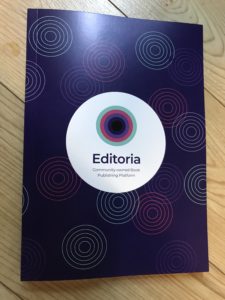This article is cross-posted from the UC Press Blog.

In 2014, UC Press and the California Digital Library were awarded a grant from the Andrew W. Mellon Foundation to build a digital book production system, which has now become known as Editoria. The vision behind Editoria was to build a digital book production that would help non-profit publishers of all stripes more efficiently manage the production of monographs. Part of the motivation behind the development of Editoria was to help ease the cost burden for publishers wishing to publish open access books. At the time, UC Press had recently launched its Luminos open access monograph publishing program, and the California Digital Library, who had long provided some degree of support for journals publishing workflows, was interested in being able to deliver book production workflow support to departments wishing to publish using OA models through their eScholarship program.
We have been working with the Collaborative Knowledge Foundation (Coko) since 2015 to develop the modules within Editoria to support the production of digital-first books through all stages of their development. Once a book is loaded into the system, by either uploading MS Word files or authoring within the application, Editoria allows users to manage its production lifecycle, including manuscript structuring and styling, copyediting and proofreading, author review, and finally automated typesetting. The application also includes modules for managing user permissions and workflow, editing using a web-based text editor, and outputs to finished PDF and EPUB files. Optionally, users can output ICML files to typeset a book in InDesign for most design-intensive books.
Editoria celebrated a major milestone on October 18th when a team comprised of members of the UC Press and CDL staff used the application to collaborate in a Book Sprint, which resulted in the production of a book using Editoria from beginning to end. The book effectively documents Editoria as it exists today, but it also does something more important—it puts forth a vision of Editoria as a piece of community-supported and community-owned publishing infrastructure and documents some of the governance guidelines for that community. Central to this vision is the notion that open access publishing needs non-commercial infrastructure to create the vibrant and diverse future that many of us envision for scholarly communication. This type of infrastructure will have the ability to support a spectrum of publishing, from robust and high-quality library publishing to the kind of rigorous, scholarly publishing that defines the imprint of the University of California Press and other university presses like it around the world.
Over time, we hope to grow the Editoria community substantially beyond the boundaries of UC, and the Editoria community meeting was evidence of the appeal of this publishing infrastructure. In attendance were representatives of organizations as diverse as the University of Michigan Press/M Publishing, Punctum Books, the University of Minnesota Press, and the University of Technology, Sydney, ePress. These organizations are committed to a future that better enables the production open scholarship utilizing open publishing infrastructure. As we set our sights on the future of scholarly communication and the tools necessary to support it, we hope Editoria and projects like it, including xPub, Manifold, Fulcrum will continue to create a path toward sustainable open access publishing. If you are interested in joining the Editoria community, please feel free to drop us a line, or come see us in-person at the Charleston Library Conference.
Tags: CDL, eScholarship, Open Access, UC Press



